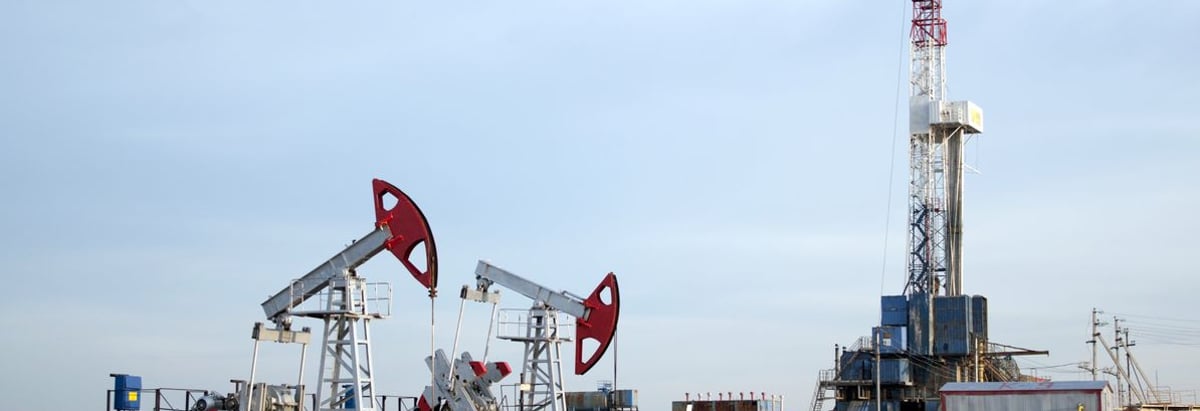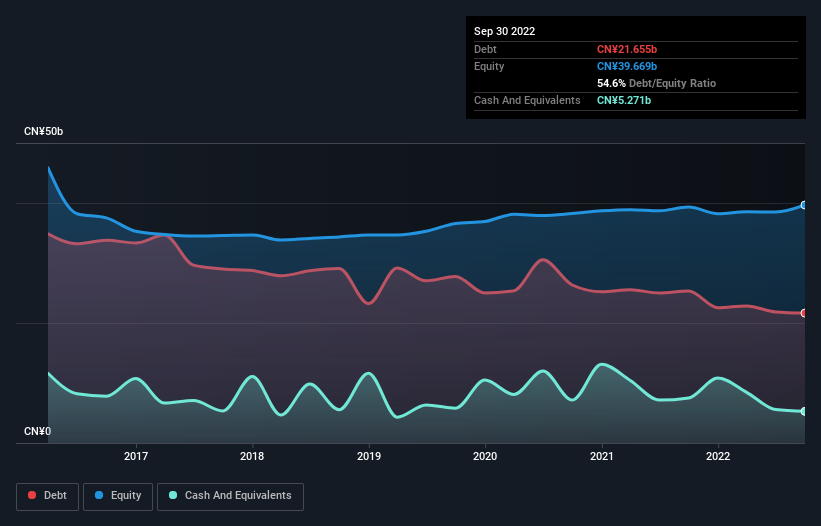- Hong Kong
- /
- Energy Services
- /
- SEHK:2883
China Oilfield Services (HKG:2883) Seems To Use Debt Rather Sparingly

Howard Marks put it nicely when he said that, rather than worrying about share price volatility, 'The possibility of permanent loss is the risk I worry about... and every practical investor I know worries about.' It's only natural to consider a company's balance sheet when you examine how risky it is, since debt is often involved when a business collapses. Importantly, China Oilfield Services Limited (HKG:2883) does carry debt. But the more important question is: how much risk is that debt creating?
What Risk Does Debt Bring?
Generally speaking, debt only becomes a real problem when a company can't easily pay it off, either by raising capital or with its own cash flow. If things get really bad, the lenders can take control of the business. However, a more common (but still painful) scenario is that it has to raise new equity capital at a low price, thus permanently diluting shareholders. Of course, plenty of companies use debt to fund growth, without any negative consequences. When we think about a company's use of debt, we first look at cash and debt together.
Check out our latest analysis for China Oilfield Services
What Is China Oilfield Services's Net Debt?
The image below, which you can click on for greater detail, shows that China Oilfield Services had debt of CN¥21.7b at the end of September 2022, a reduction from CN¥25.3b over a year. However, because it has a cash reserve of CN¥5.27b, its net debt is less, at about CN¥16.4b.

How Healthy Is China Oilfield Services' Balance Sheet?
According to the last reported balance sheet, China Oilfield Services had liabilities of CN¥19.5b due within 12 months, and liabilities of CN¥16.1b due beyond 12 months. Offsetting these obligations, it had cash of CN¥5.27b as well as receivables valued at CN¥17.8b due within 12 months. So its liabilities outweigh the sum of its cash and (near-term) receivables by CN¥12.6b.
Since publicly traded China Oilfield Services shares are worth a total of CN¥63.0b, it seems unlikely that this level of liabilities would be a major threat. However, we do think it is worth keeping an eye on its balance sheet strength, as it may change over time.
We use two main ratios to inform us about debt levels relative to earnings. The first is net debt divided by earnings before interest, tax, depreciation, and amortization (EBITDA), while the second is how many times its earnings before interest and tax (EBIT) covers its interest expense (or its interest cover, for short). This way, we consider both the absolute quantum of the debt, as well as the interest rates paid on it.
China Oilfield Services's net debt to EBITDA ratio of about 2.4 suggests only moderate use of debt. And its strong interest cover of 11.6 times, makes us even more comfortable. It is well worth noting that China Oilfield Services's EBIT shot up like bamboo after rain, gaining 34% in the last twelve months. That'll make it easier to manage its debt. The balance sheet is clearly the area to focus on when you are analysing debt. But ultimately the future profitability of the business will decide if China Oilfield Services can strengthen its balance sheet over time. So if you're focused on the future you can check out this free report showing analyst profit forecasts.
Finally, while the tax-man may adore accounting profits, lenders only accept cold hard cash. So we clearly need to look at whether that EBIT is leading to corresponding free cash flow. Over the last three years, China Oilfield Services recorded free cash flow worth a fulsome 95% of its EBIT, which is stronger than we'd usually expect. That positions it well to pay down debt if desirable to do so.
Our View
China Oilfield Services's conversion of EBIT to free cash flow suggests it can handle its debt as easily as Cristiano Ronaldo could score a goal against an under 14's goalkeeper. But truth be told we feel its net debt to EBITDA does undermine this impression a bit. Looking at the bigger picture, we think China Oilfield Services's use of debt seems quite reasonable and we're not concerned about it. While debt does bring risk, when used wisely it can also bring a higher return on equity. There's no doubt that we learn most about debt from the balance sheet. But ultimately, every company can contain risks that exist outside of the balance sheet. Be aware that China Oilfield Services is showing 3 warning signs in our investment analysis , you should know about...
When all is said and done, sometimes its easier to focus on companies that don't even need debt. Readers can access a list of growth stocks with zero net debt 100% free, right now.
New: AI Stock Screener & Alerts
Our new AI Stock Screener scans the market every day to uncover opportunities.
• Dividend Powerhouses (3%+ Yield)
• Undervalued Small Caps with Insider Buying
• High growth Tech and AI Companies
Or build your own from over 50 metrics.
Have feedback on this article? Concerned about the content? Get in touch with us directly. Alternatively, email editorial-team (at) simplywallst.com.
This article by Simply Wall St is general in nature. We provide commentary based on historical data and analyst forecasts only using an unbiased methodology and our articles are not intended to be financial advice. It does not constitute a recommendation to buy or sell any stock, and does not take account of your objectives, or your financial situation. We aim to bring you long-term focused analysis driven by fundamental data. Note that our analysis may not factor in the latest price-sensitive company announcements or qualitative material. Simply Wall St has no position in any stocks mentioned.
About SEHK:2883
China Oilfield Services
Provides integrated oilfield services in China, Indonesia, Mexico, Norway, Rest of Middle East, and internationally.
Solid track record with excellent balance sheet.


